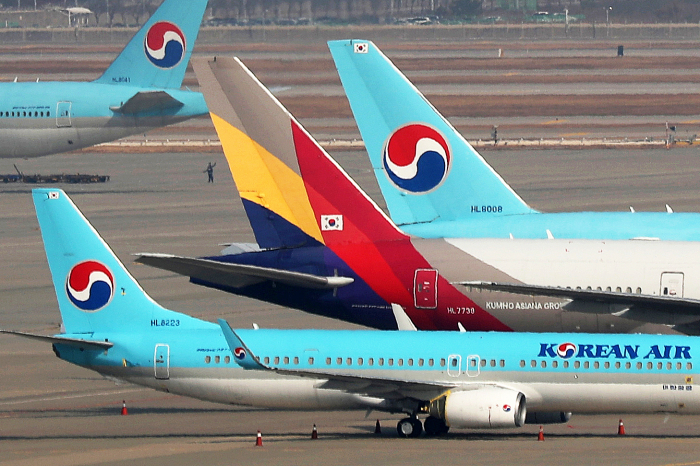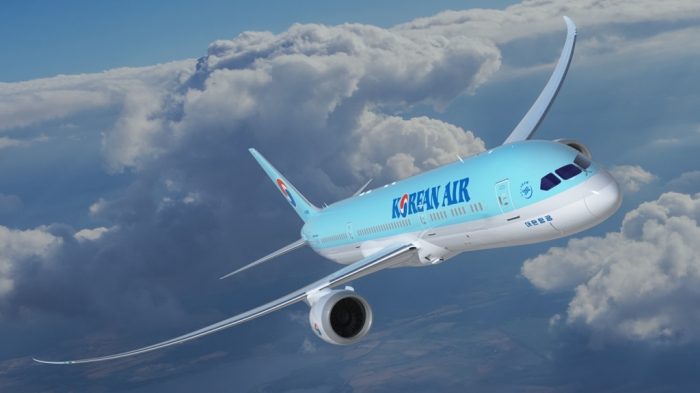M&As
Korean Air’s post-merger plan hits snag after conditional approval
Job cuts and a drastic fleet readjustment may be needed to meet the conditions set forth by the regulator
By Jan 04, 2022 (Gmt+09:00)
2
Min read
Most Read
LG Chem to sell water filter business to Glenwood PE for $692 million


Kyobo Life poised to buy Japan’s SBI Group-owned savings bank


KT&G eyes overseas M&A after rejecting activist fund's offer


StockX in merger talks with Naver’s online reseller Kream


Mirae Asset to be named Korea Post’s core real estate fund operator



Korean Air Lines Co. faces growing pressure from the country’s antitrust regulator to drastically adjust its post-merger integration plans after it obtained conditional approval for its 1.8 trillion won ($1.6 billion) deal to acquire smaller rival Asiana Airlines Inc.
Some 400 billion won in annual cost cuts initially expected from the merger will also shrink significantly, forcing Korean Air to figure out what other synergy it could create from its acquisition of the debt-laden company, industry watchers said.
Korea’s Fair Trade Commission (FTC) said in its 2022 policy plan on Tuesday that it will convene a meeting by February at the latest to complete all the procedures required for the proposed combination of Korean Air and Asiana.
Last week, the commission approved the merger with conditions, including business restrictions, to address monopoly concerns.
Under the conditions set by the FTC, the two companies are required to relinquish a portion of their airport slots and traffic rights, which will be reallocated to other airlines.
The regulator has also called for service cutbacks to some overseas routes, while asking Korean Air to refrain from fare increases.
The conditional green light came after Korean Air submitted its post-merger integration plans to its main creditor Korea Development Bank (KDB) and the transport ministry in June 2021.
The flagship carrier said at the time it expects to achieve economies of scale and financial synergy from the merged entity, including up to 400 billion won in annual cost cuts, while limiting layoffs, if the aviation industry recovers from the pandemic.

MOUNTING HURDLES
Analysts say Korean Air now will have to drastically revise its post-merger plans to meet the requirements put forward by the FTC.
Reduced air traffic rights could also lead to job cuts as well as a smaller-than-planned fleet for the merged entity, they said.
“Korean Air has promised the state-run KDB no job cuts after the merger. But under the FTC-set conditions, it may not be able to keep the promise,” said Huh Hee-young, a professor at Korea Aerospace University.
Industry officials said Korean Air may also need to change its fleet readjustment plans.
Korean Air Chairman Cho Won-tae said in August the company plans to retire its fleet of superjumbo jets upon the expiry of its lease contracts on the A380 and B747 planes, and instead buy more of two-engine passenger aircraft, including Boeing’s 787 Dreamliner.
The proposed merger also requires regulatory approval from antitrust agencies in other countries.
Korean Air has so far received approval from only four countries – Turkey, Taiwan Thailand and Vietnam. It is awaiting the go-ahead from the aviation authorities in the US, Japan and China as well as the European Union.
Korean Air’s parent Hanjin KAL Corp. and the KDB announced in November of 2020 that Korean Air will acquire a 63.9% stake in Asiana to create one of the world’s top 10 carriers by 2024.
Write to Kyung-Min Kang at Kkm1026@hankyung.com
In-Soo Nam edited this article.
More to Read
-

-
 M&AsKorean Air gets Vietnam’s regulatory approval for acquisition of Asiana
M&AsKorean Air gets Vietnam’s regulatory approval for acquisition of AsianaNov 16, 2021 (Gmt+09:00)
1 Min read -
 AirlinesKorean Air won't sell Asiana's budget carriers post-merger
AirlinesKorean Air won't sell Asiana's budget carriers post-mergerJul 19, 2021 (Gmt+09:00)
2 Min read -
 Post-mergerKorean Air eyes $350 mn in cost savings from Asiana merger
Post-mergerKorean Air eyes $350 mn in cost savings from Asiana mergerApr 01, 2021 (Gmt+09:00)
2 Min read -
 AirlinesKorean Air to buy rival Asiana in $1.6 bn deal to emerge as world’s 7th airline
AirlinesKorean Air to buy rival Asiana in $1.6 bn deal to emerge as world’s 7th airlineNov 16, 2020 (Gmt+09:00)
5 Min read
Comment 0
LOG IN


